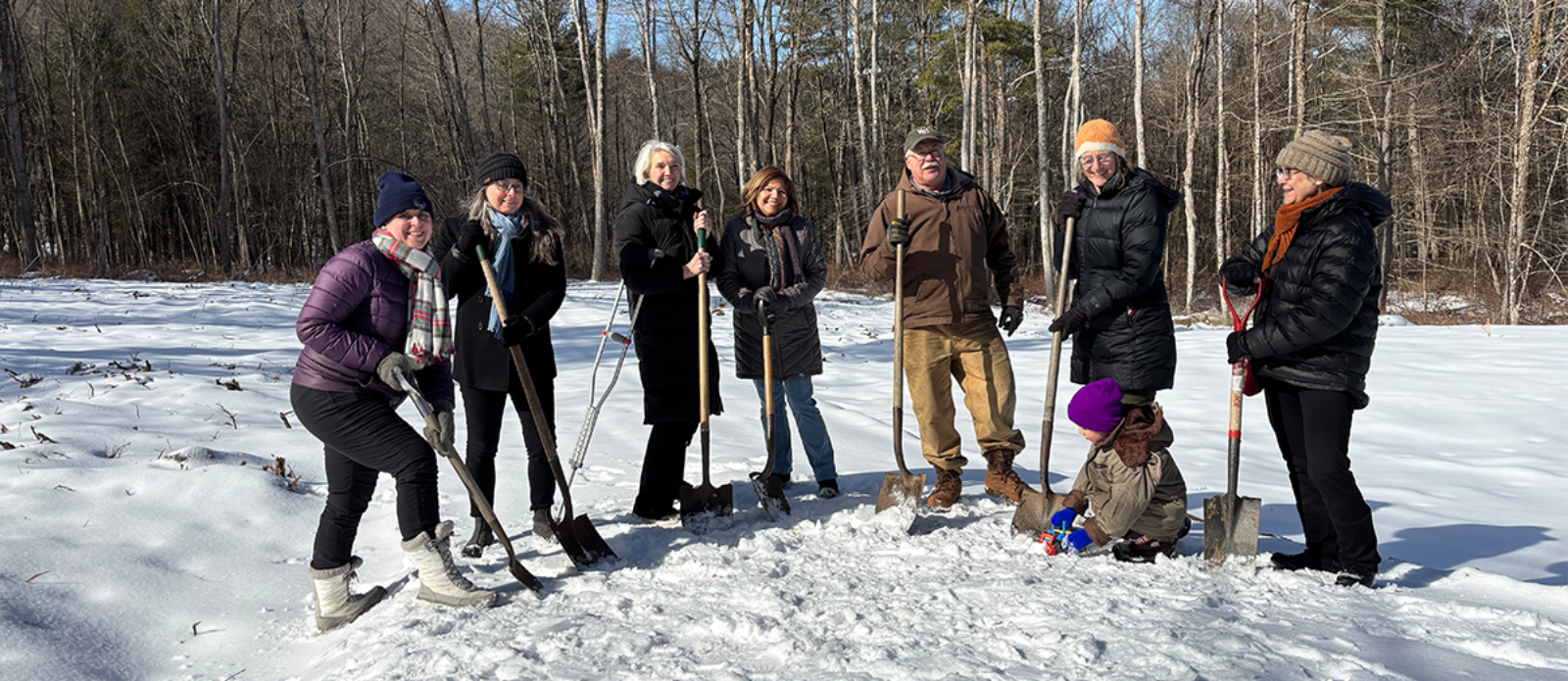As rents and housing prices rise rapidly across the country, housing advocates, local municipalities and nonprofits are working double-time to find as many solutions as possible to keep people housed safely and affordably now. At the same time, they are laying the groundwork for future housing affordability and stability in our towns.1
Though it takes time to design solutions and for projects to come to fruition, housing advocates collaborating across the sector are encouraged to see their efforts gain traction. Berkshire Taconic supports projects generated from a variety of perspectives across our four-county region:
Creating Achievable Paths to Home Ownership
Multiple Grants Boost New Housing Nonprofit in Columbia County, N.Y.
Our Fund for Columbia County (FCC) is supporting a new nonprofit working in the housing sector, Trillium Community Land Trust (TCLC). In 2023, FCC contributed funds to TCLC to achieve 501c3 status. In 2024, Trillium received two types of grants to further develop their organizational capacity and efficacy: a New Nonprofit grant and a Planning and Technical Assistance grant. These grants go toward a pilot program with Hudson River Housing (HRH) to assess and identify properties suitable for affordable housing development. Their approach is part of a growing awareness of the potential to find solutions that support both conservation and the need for permanently affordable housing to keep communities whole. Trillium’s mission is to empower community-based ownership of land for housing and related residential needs (community centers, daycare centers, farms, etc.) in Columbia County. Their decision-making structure incorporates community voices to foster trust and lay the groundwork for success.
Trillium’s Board President Michelle Tullo shares that their project model requires “affordability in perpetuity," which means that if any of their affordable homes are re-sold, they must be offered at a price supported by a low-to-moderate income range forever, rather than the thirty-year model offered by most other state programs. Their first project will provide affordable homeownership, targeting households “making up to 100% of Columbia County Area Median Income (AMI), which is currently $85,000 for a household of two.” For rental units, rents will be capped to be affordable to low-to-moderate income levels, determined by a variety of factors, including AMI.
Breaking Ground for Ten New Affordable Single-Family Homes in Connecticut
In 2023, BTCF partnered with the Foundation for Community Health and Litchfield County Center for Housing Opportunity (LCCHO) to launch the Create Housing Grant Opportunity for the Northwest Corner of Litchfield County, Conn. to facilitate housing solutions through a similar collaborative lens: merging the need for housing and economic growth with long-term commitments to conservation of the region's natural beauty. The first grants were awarded to Litchfield Hills Greenprint Collaborative and Kent Affordable Housing, with technical assistance provided by LCCHO.
The Greenprint Collaborative is a partnership of 30+ conservation and land trust organizations that has developed a strategy to guide their collaborative work. During 2024, over sixty representatives from local and regional housing, town planning and conservation organizations, as well as Habitat for Humanity, have met to discuss ways to generate affordable housing.
Now in its second phase, the program’s efforts are paying off. In February of 2025, a groundbreaking celebration for The Litchfield County Affordable Homeownership Program in West Cornwall, Conn., kicked off a project of 10 new homes.2 Sale prices will be in a range supportable by households earning under the AMI in Litchfield County. The construction phase will take approximately nine months to complete. Local housing non-profits will continue to own the land under these homes and will ensure their continued affordability over time.
Twelve New Townhomes to be Built on the West Side of Pittsfield, Massachusetts
Tony Jackson, founder of Pittsfield’s Westside Legends (WSL), shares that WSL plans to break ground in March 2025 for The Legacy Collection: twelve single-family townhomes. BTCF’s Community Fund contributed $30,000 toward the launch and predevelopment phase of this project, which will generate more achievable paths to home ownership than traditional models. This is one of Westside Legends’ many programs focused on revitalizing, stabilizing and celebrating the west side of Pittsfield.
Addressing Immediate & Severe Need for Renters and the Homeless
Volunteer Fire Department and Housing Advocates Join Forces in Connecticut
Justin Potter, President of Kent Affordable Housing in Northwest Litchfield County, Conn., shares that local employees and volunteers for the Kent Fire Department and other key organizations are being forced out by the lack of affordable housing. He notes that New York State fire departments that have created housing for their volunteers have developed “a great asset for recruiting, retention, and improved response times.” Lack of housing incurs another cost. The town has had to hire outside EMS coverage to meet need, at a cost of over $320,000 per year.
A committee meets regularly to brainstorm solutions, with representatives from the Kent Fire Department, Kent Affordable Housing, Jocelyn Ayer from LCCHO, and David Berto from Housing Enterprises. They are exploring multiple options for providing housing that would be affordable to fire department volunteers.
Data-driven Program Identifies Severe Need
Berkshire Taconic contributed $10,000 from its Community Fund to Community Action of Pioneer Valley (CAPV) for Berkshire County housing support. CAPV’s work prioritizes addressing severe need, housing instability and homelessness. Individuals and families are connected to housing, services, and benefits. CAPV identifies need and severity data via the HMIS (Homeless Management Information System). BTCF’s grant supports staff in this effort. Staff will be trained on the HMIS system, meet regularly to discuss cases and conduct the annual Point-In-Time (PIT) count in Berkshire County. PIT is a count of the homeless population on one night in January and includes providing cold-weather items such as hats, gloves, thermal underwear and socks for unsheltered people.
Local Journalism Reveals the Breadth of Need in Berkshire County
The Berkshire Eagle Local Journalism Fund supports journalist Claire O'Callahan who is shining a light on emerging developments in housing. A recent story covered the rising rate of Pittsfield high school students identifying themselves as homeless. Another, raised rents under new ownership for an apartment complex in Great Barrington catering to seniors. As the community conversation around housing expands in scope, investigative journalism supported by BTCF reflects the experiences of residents and holds authorities accountable.
Emergency Rent Assistance and Resources Stabilize Housing in Northeast Dutchess County, N.Y.
NEDCorps, an initiative of BTCF’s Northeast Dutchess Area Fund, started the Housing Stabilization Fund in 2024. The program is twofold: one-time funding assistance for renters, (up to $5K per household, up to 12 households), and counseling on additional support services as needed, including legal services. NEDCorps partners with the North East Community Center (NECC), a nonprofit based out of Millerton, N.Y. NECC provides case managers that advocate directly for tenants. They also liaise with landlords to ameliorate and resolve any issues of misunderstanding, contention or mistreatment by landlords. Case managers work with renters over the course of six to twelve months to ensure tenants can assume the full cost of their rent once the grant is expended, and encourage landlords to work with the program, as improved relations and a stabilized environment have long-term benefits for everyone.
People First
The compassion, dedication, and collaboration of volunteers, housing advocates and town governments continues to keep residents’ right to affordable housing front and center in their decision-making. With relationship-building and well-developed strategies, these collective efforts emphasize sustainability, economic growth, and the long-term well-being of our communities.
ACKNOWLEDGEMENTS
Research for this article included collaboration with Berkshire Taconic Community Engagement Officers Leila Kaplan (Columbia & Berkshire Counties) and Aileen Meehan (Northwest Litchfield and Northeast Dutchess counties). Additionally, we appreciate the firsthand insights from grantees and community partners Michelle Tullo (Trillium Community Land Trust), Jocelyn Ayer (Litchfield County Centers for Housing Opportunity) and Tony Jackson (Pittsfield’s Westside Legends).
FOOTNOTES
1. Though lower-wage workers are most vulnerable, a widening demographic of higher-wage earners are finding it prohibitively expensive to rent, let alone achieve homeownership. Almost 50% of renters in Massachusetts alone identify as “cost-burdened;” their rent and utility costs exceed 30% of their income. While high rents create a stressful economic ripple effect in peoples’ lives, a dearth in affordable housing also keeps towns on tenuous ground. Towns need employees and customers for businesses and local economies to thrive. Moreover, they need crucial support services offered by trained professionals in healthcare, teaching, firefighting and more.
2. The Cornwall Housing Corporation will build 3 homes in Cornwall, Conn. / The Salisbury Housing Trust will build 4 homes in Salisbury, Conn. / The Foundation for Norfolk Living will build 1 home in Norfolk, Conn. / The Washington Community Housing Trust will build 1 home in Washington, Conn. / Northwest Connecticut Habitat for Humanity will build 1 home in North Canaan, Conn.




